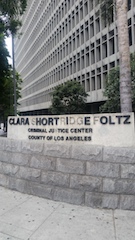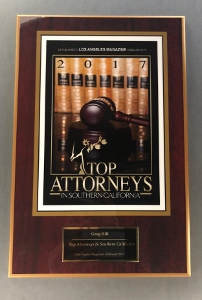Our office is regularly asked this opening question, often as a way to jump start a conversation concerning whether the client is eligible for such relief. The answer that we give is that a certificate of rehabilitation is a judge’s ruling that an individual is now of good moral character and obeying the laws. In other words, there is a certification of rehabilitation. It is most often sought by someone who served time in prison and is therefore ineligible for expungement.
In a Nutshell: A certificate of rehabilitation is literally, as its name suggests, a finding by a judge that someone is rehabilitated. This finding allows the individual certain things (relief from 290 registration being the biggest thing) and automatically qualifies one to apply for a governor’s pardon. There are varying residency requirements for applying, so read the article here.
Someone who served time for murder, kidnapping, and certain child pornography convictions may apply for such a certificate of rehabilitation, although there are slightly different waiting time requirements before applying.
 Criminal Courts Building Downtown LA Courthouse
Criminal Courts Building Downtown LA Courthouse
The general rule is that if someone has been a resident of California for the past five years after being released from parole or probation, he or she should consider applying for a certificate of rehabilitation in the county of her residence. If the person was convicted of certain offenses (i.e. Penal Code §§ 187, 209, 219, 311.2, 311.3, 311.10, 314, 4500 or 18755), two or five years more to wait before applying may be required. However, California Gov. Brown signed SB 530 on October 10, 2013 and among other things it created a new section of the California Penal Code § 4852.22, which now allows trial courts to approve early Certificate of Rehabilitation applications if, in their discretion, the interests of justice are served.
California Penal Code § 4852.05 controls the judge’s analysis of a request for a certificate of rehabilitation. Section 4852.05 states that to apply, “the person shall live an honest and upright life, shall conduct himself or herself with sobriety and industry, shall exhibit a good moral character, and shall conform to and obey the laws of the land.”
In deciding whether the applicant has met such rather ambiguous requirements, the court will first look at whether the applicant has resided in California for five continuous years since being released from prison, jail, a detention facility or any other institution. The applicant, if placed on parole, must complete one year of residency after being released from parole (as well as the five year requirement).
Second, the judge will verify that the applicant was not convicted of certain offenses, as certain offenses are not eligible for a certificate of rehabilitation. They are Penal Code § 286(c) (sodomy of a minor), 288 (lewd acts with a minor – child molestation), 288a(c) (oral copulation with a minor), 288.5 (continuous sexual abuse of a child) and 289(j) (forcible sexual penetration of a child) or you received a sentence involving life parole.

The benefits of receiving a certificate of rehabilitation are attractive to many who have previously had difficulty obtaining employment. For example, under Penal Code § 4852.17, once a certificate of rehabilitation is granted, the clerk is supposed to immediately report it to the Department of Justice, which is then supposed to transmit this change of status to the FBI in Washington, D.C. Also, under Penal Code § 4852.16, once a certificate of rehabilitation is granted, the clerk is required to immediately transmit certified copies to the Governor of the State of California for a full pardon. The governor may then grant the pardon without further investigation. If a pardon is granted, the person can again vote and own and possess a firearm, unless the felony conviction at issue involved the use of a dangerous weapon.
A common applicant interested in such a certificate is a registered sex offender. This is because a certificate of rehabilitation (as well as a pardon) will relieve the applicant of the Penal Code § 290 registration requirements.
People v. Garcia (2008) 74 Cal.Rptr.3d 681, 161 Cal.App4th 475;
see also People v. Zaidi (2007) 55 Cal.Rptr 3d. 566, 147 Cal.Rptr.4th 1470.
It is important to understand that a pardon does not erase the underlying conviction.
People v. Mendez (1991) 286 Cal.Rptr. 216, 234 Cal.App.3d 1173. It also does not seal the records or destroy the file. In fact, a pardoned felon is still required to register as applicable under local ex-convict registration ordinances. 28 Op.Atty.Gen. 178, 10-5-56.
In addition, under Business and Professions Code § 480, if one is granted a certificate of rehabilitation, that person may not be denied a business or professional license based only on his or her conviction. Also, under Evidence Code § 788, a granted certificate of rehabilitation prevents another party at trial from impeaching a person’s credibility by introducing the prior felony conviction. This can be a big benefit in a custody battle for children or in a divorce proceeding where the other spouse is eager to let a judge know about their soon-to-be-ex’s criminal history. This will put an end to such an attack.
A few other interesting facts to consider in such an application. It is one of the few motions where the motion is only signed by the client (the attorney does not sign anywhere). In addition, while the motion is made to the same judge that convicted the applicant, a copy of the application must be served on the Governor’s office. The process usually involves several court appearances and the district attorney will conduct their own background check on you.
For more information about post-conviction relief, click on the following articles:
Contact Greg Hill & Associates
 Criminal Courts Building Downtown LA Courthouse
Criminal Courts Building Downtown LA Courthouse